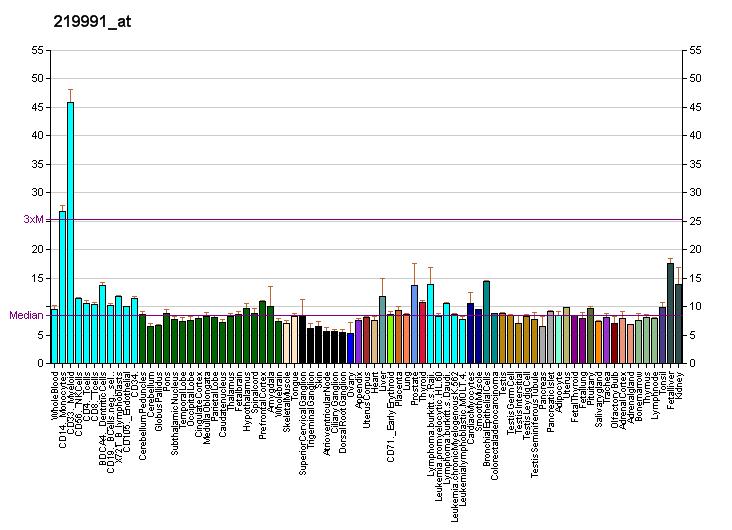SLC2A9: Difference between revisions
m (Robot: Automated text replacement (-{{SIB}} +, -{{EH}} +, -{{EJ}} +, -{{Editor Help}} +, -{{Editor Join}} +)) |
m (Robot: Automated text replacement (-{{reflist}} +{{reflist|2}}, -<references /> +{{reflist|2}}, -{{WikiDoc Cardiology Network Infobox}} +)) |
||
| Line 62: | Line 62: | ||
==References== | ==References== | ||
{{reflist}} | {{reflist|2}} | ||
==Further reading== | ==Further reading== | ||
Revision as of 14:39, 6 September 2012
| Solute carrier family 2 (facilitated glucose transporter), member 9 | |||||||||||
|---|---|---|---|---|---|---|---|---|---|---|---|
| Identifiers | |||||||||||
| Symbols | SLC2A9 ; GLUT9; GLUTX | ||||||||||
| External IDs | Template:OMIM5 Template:MGI HomoloGene: 69290 | ||||||||||
| |||||||||||
| RNA expression pattern | |||||||||||
 | |||||||||||
| More reference expression data | |||||||||||
| Orthologs | |||||||||||
| Template:GNF Ortholog box | |||||||||||
| Species | Human | Mouse | |||||||||
| Entrez | n/a | n/a | |||||||||
| Ensembl | n/a | n/a | |||||||||
| UniProt | n/a | n/a | |||||||||
| RefSeq (mRNA) | n/a | n/a | |||||||||
| RefSeq (protein) | n/a | n/a | |||||||||
| Location (UCSC) | n/a | n/a | |||||||||
| PubMed search | n/a | n/a | |||||||||
Editor-In-Chief: C. Michael Gibson, M.S., M.D. [1]
Overview
Solute carrier family 2 (facilitated glucose transporter), member 9, also known as SLC2A9, is a human gene.[1] This gene encodes a member of the SLC2A facilitative glucose transporter family. Members of this family play a significant role in maintaining glucose homeostasis. The encoded protein may play a role in the development and survival of chondrocytes in cartilage matrices. Two transcript variants encoding distinct isoforms have been identified for this gene.[1] SLC2A9 has also recently been found to transport uric acid and genetic variants of the transporter have been linked to increased risk of development of gout.[2][3]
See also
References
- ↑ 1.0 1.1 "Entrez Gene: SLC2A9 solute carrier family 2 (facilitated glucose transporter), member 9".
- ↑ Vitart V, Rudan I, Hayward C; et al. (2008). "SLC2A9 is a newly identified urate transporter influencing serum urate concentration, urate excretion and gout". Nature Genetics. 40 (4). doi:10.1038/ng.106.
- ↑ Döring A, Gieger C, Mehta D; et al. (2008). "SLC2A9 influences uric acid concentrations with pronounced sex-specific effects". Nature Genetics. 40 (4). doi:10.1038/ng.107.
Further reading
- Phay JE, Hussain HB, Moley JF (2000). "Cloning and expression analysis of a novel member of the facilitative glucose transporter family, SLC2A9 (GLUT9)". Genomics. 66 (2): 217–20. doi:10.1006/geno.2000.6195. PMID 10860667.
- Doege H, Bocianski A, Joost HG, Schürmann A (2001). "Activity and genomic organization of human glucose transporter 9 (GLUT9), a novel member of the family of sugar-transport facilitators predominantly expressed in brain and leucocytes". Biochem. J. 350 Pt 3: 771–6. PMID 10970791.
- Shikhman AR, Brinson DC, Valbracht J, Lotz MK (2001). "Cytokine regulation of facilitated glucose transport in human articular chondrocytes". J. Immunol. 167 (12): 7001–8. PMID 11739520.
- Mobasheri A, Neama G, Bell S; et al. (2002). "Human articular chondrocytes express three facilitative glucose transporter isoforms: GLUT1, GLUT3 and GLUT9". Cell Biol. Int. 26 (3): 297–300. doi:10.1006/cbir.2001.0850. PMID 11991658.
- Strausberg RL, Feingold EA, Grouse LH; et al. (2003). "Generation and initial analysis of more than 15,000 full-length human and mouse cDNA sequences". Proc. Natl. Acad. Sci. U.S.A. 99 (26): 16899–903. doi:10.1073/pnas.242603899. PMID 12477932.
- Richardson S, Neama G, Phillips T; et al. (2003). "Molecular characterization and partial cDNA cloning of facilitative glucose transporters expressed in human articular chondrocytes; stimulation of 2-deoxyglucose uptake by IGF-I and elevated MMP-2 secretion by glucose deprivation". Osteoarthr. Cartil. 11 (2): 92–101. PMID 12554125.
- Ota T, Suzuki Y, Nishikawa T; et al. (2004). "Complete sequencing and characterization of 21,243 full-length human cDNAs". Nat. Genet. 36 (1): 40–5. doi:10.1038/ng1285. PMID 14702039.
- Augustin R, Carayannopoulos MO, Dowd LO; et al. (2004). "Identification and characterization of human glucose transporter-like protein-9 (GLUT9): alternative splicing alters trafficking". J. Biol. Chem. 279 (16): 16229–36. doi:10.1074/jbc.M312226200. PMID 14739288.
- Gerhard DS, Wagner L, Feingold EA; et al. (2004). "The status, quality, and expansion of the NIH full-length cDNA project: the Mammalian Gene Collection (MGC)". Genome Res. 14 (10B): 2121–7. doi:10.1101/gr.2596504. PMID 15489334.
This article incorporates text from the United States National Library of Medicine, which is in the public domain.